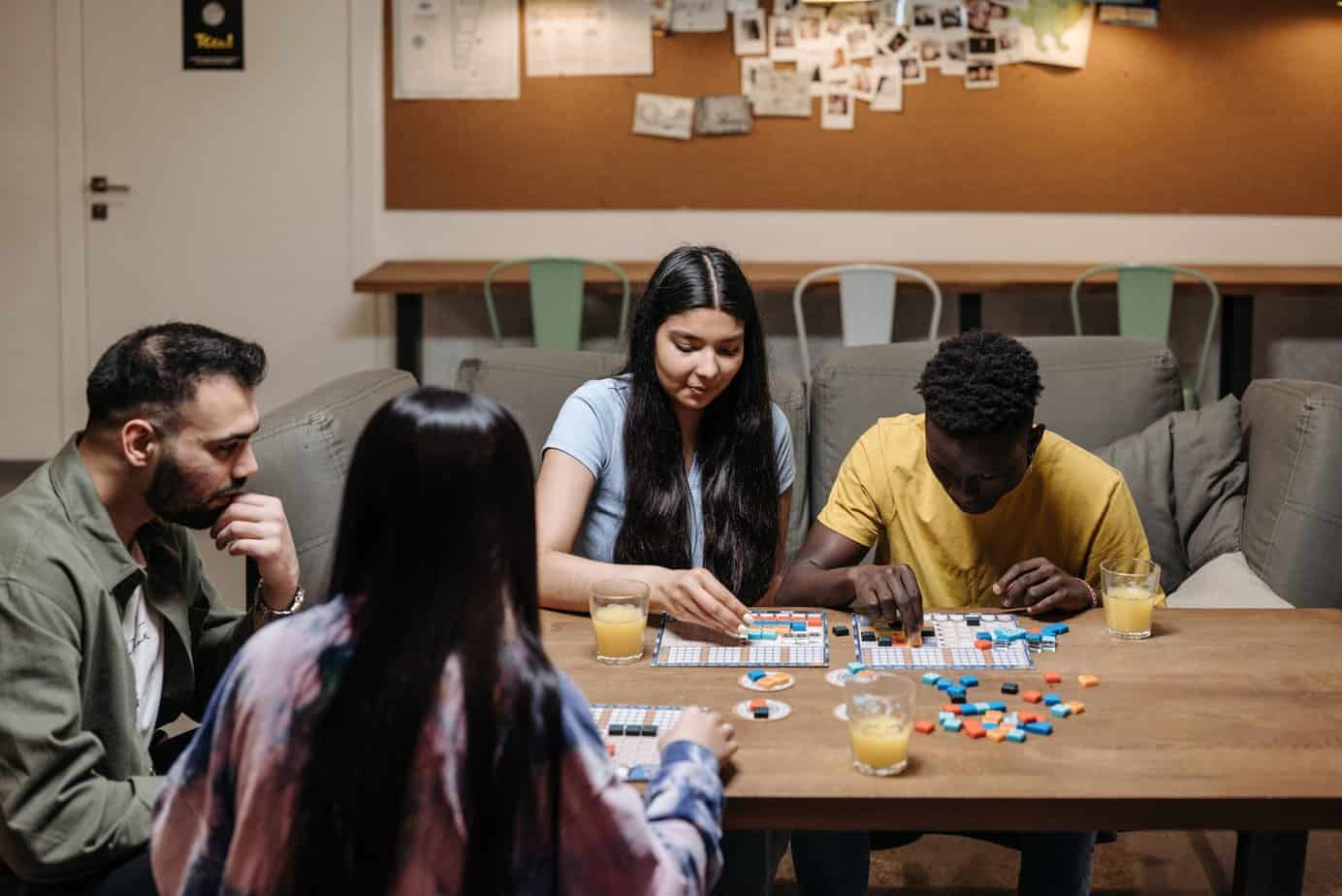People of all ages and cultures have enjoyed board games for thousands of years. Whether you are a seasoned gamer or just starting to explore the world of board games, learning board games and how to play them can be a fun and rewarding experience. Board games can help improve critical thinking, decision-making, and social skills while providing an enjoyable time to spend with family and friends.
In this article, we will explore the basic mechanics of board games and the different types of games available. We will also provide tips and strategies for playing and mastering board games and practical advice on how to learn and teach new games. By the end of this article, you will better understand the world of board games and the best ways to approach playing and learning new games. So let’s roll the dice and get started!
Basic Board Game Mechanics
To understand how to play board games, it’s essential to understand the basic mechanics familiar to most games. These mechanics include:
- Objectives and win conditions: Every game has a goal, and the first step to playing any game is to understand what you need to do to win. Some games may have multiple ways to win or alternate win conditions, so reading the rules carefully is essential.
- Game components and setup: Board games have various features, such as boards, cards, dice, tokens, and pieces. Setting up the game correctly is essential for playing it correctly, so follow the instructions in the rulebook carefully.
- Turn order and actions: Most board games have a turn-based system where players take turns performing actions. Understanding the turn order and the available actions is crucial for planning your strategy and making the most of your turns.
- Movement and positioning: Many board games involve the movement of pieces or characters across the board. Understanding the rules for movement and positioning can help you control the board and gain an advantage over your opponents.
- Randomness and luck: Many board games include an element of chance, such as rolling dice or drawing cards. Knowing how to deal with randomness and incorporate luck into your strategy is an important part of playing board games.
By understanding these basic mechanics, you can quickly learn how to play new board games and apply your knowledge to different types of games. In the next section, we’ll explore the different kinds of board games and the unique mechanics that they each bring to the table.
Types of Board Games
There are many different types of board games, each with its unique mechanics, gameplay, and objectives. Here are a few of the most common types of board games:
- Strategy games: These games require careful planning and decision-making to outmaneuver your opponents and achieve your objectives. Examples of strategy games include chess, Risk, and Settlers of Catan.
- Party games: These games are designed for larger groups and focus on social interaction, creativity, and humor. Examples of party games include Cards Against Humanity, Pictionary, and Charades.
- Cooperative games: Players work together to achieve a common goal, often against a common enemy. Examples of cooperative board games include Pandemic, Arkham Horror, and Forbidden Island.
- Deck-building games: These games involve constructing a deck of cards with different abilities and using them to defeat your opponents. Examples of deck-building games include Dominion, Magic: The Gathering, and Hearthstone.
- Role-playing games: In these games, players take on the roles of characters in a fictional world and engage in storytelling and adventure. Examples of role-playing games include Dungeons & Dragons, Pathfinder, and Shadowrun.
Understanding the type of game you are playing can help you tailor your strategy and approach accordingly. For example, you might focus on controlling resources and territory in a strategy game. In contrast, you prioritize socializing and having fun with your friends in a party game. The following section will explore strategies for playing and winning board games.
Strategies for Playing Board Games
Playing board games can be fun, but winning is even better. Here are some strategies to help you improve your chances of winning:
Read the rules carefully:
One of the most critical steps when playing a new board game is carefully reading the rules. Ensure you fully understand the game mechanics, objectives, and win conditions before playing. This will help you make better decisions and avoid costly mistakes.
Take the time to read through the rules, paying particular attention to any exceptions, special cases, or nuances. If you’re playing with a group, ensure everyone is on the same page before you start.
Observe your opponents:
Observe how your opponents are interacting with the game board, what cards they are playing, and what decisions they are making. This will help you identify potential weaknesses and opportunities and adjust your approach accordingly.
Paying attention to what your opponents are doing and trying to predict their next moves can help you plan your strategy and stay ahead of the competition.
Plan Ahead:
Thinking several moves ahead and anticipating the consequences of your actions is a key strategy in many board games. This will help you make more informed decisions and avoid getting caught off guard.
Consider different scenarios and try to predict how your opponents might respond to your moves. Make a mental or physical note of your plan, and adjust it based on new information or changing circumstances.
Control the board:
Controlling as much board as possible can give you a significant advantage in many board games. This might mean controlling resources, territory, or other game elements. By managing critical areas of the board, you can limit your opponents’ options and make it harder for them to win.
However, remember that focusing too much on control can sometimes backfire, so weigh the potential benefits against the potential costs.
Take risks:
Sometimes taking risks can pay off, especially if you fall behind or need to catch up. However, before making bold moves, weighing the potential rewards against the possible consequences is essential.
Consider the worst-case scenario and whether you can afford to take the risk. If you decide to take a chance, ensure you have a backup plan if things don’t go as expected.
Be adaptable:
Being adaptable and able to adjust your approach can be a key factor in winning board games. Be bold and change your strategy if it’s not working or if circumstances change. Pay attention to what your opponents are doing and adjust your approach accordingly.
This might mean changing your focus, taking more risks, or shifting your priorities. By being adaptable, you can stay ahead of the competition and increase your chances of winning.
Following these strategies can improve your gameplay and increase your chances of winning. However, remember that luck and chance are essential in many board games, so don’t get discouraged if things don’t go your way. With practice and experience, you’ll become a more skilled and strategic board game player.
Tips for Learning Board Games
Learning a new board game can be a fun and rewarding experience. Still, it can also be intimidating, especially if you need to familiarize yourself with the rules or mechanics. Here are some tips to make the process of learning a new board game more manageable and more enjoyable:
Start with simpler games:
Suppose you’re new to board games or trying to introduce someone else to the hobby. In that case, starting with simpler games with easy-to-understand rules and mechanics is a good idea.
This will help you build your confidence and get a feel for how board games work before moving on to more complex games.
Read the rules carefully:
Before playing a new board game, take the time to read the rules carefully. Ensure you understand the game’s mechanics, objectives, and special rules or exceptions. It’s also a good idea to read the rulebook in advance, so you can be prepared and have any questions ready to ask during the game.
Watch tutorial videos:
Tutorial videos can be a great way to learn a new board game, especially if you’re a visual learner. Many board game publishers and enthusiasts create tutorial videos explaining different game rules and mechanics. You can find tutorial videos on YouTube, BoardGameGeek, or the publisher’s website.
Play a practice round:
Before diving into a complete game, consider playing a practice round to get a feel for the game mechanics and test different strategies.
After the practice round, take some time to discuss how it went and any areas where you might need to clarify the rules or adjust your approach. This can also help you identify any confusion or rules you missed during the initial read-through.
Learn from others:
If you’re playing with more experienced board game players, don’t be afraid to ask for advice or tips. More experienced players can often offer valuable insights and strategies that can help you improve your game. Try different approaches and techniques to see what works best for you.
Take breaks:
Learning a new board game can be mentally exhausting, so taking breaks and recharging your batteries is essential. Take some time to stretch, walk around, or grab a snack to help you stay focused and energized.
Being patient and transparent in your explanations is essential if you teach a board game. Refrain from assuming that everyone will understand the rules or mechanics immediately. Be prepared to answer questions or clarify any unclear points. Make sure to highlight the strengths and unique features of the game, and encourage everyone to try out different strategies and approaches. For more information on teaching board games, check out our article “How To Teach Board Games“
Learning Board Games Conclusion
In conclusion, board games can be a fun and engaging hobby that provides a great way to spend time with friends and family. By understanding the basic mechanics and different types of board games and adopting effective gameplay strategies, you can maximize your enjoyment of this activity.
When learning a new board game, take your time to read the rules carefully, watch tutorial videos, and practice playing to get a feel for the game mechanics.
Remember to take breaks and ask for advice from more experienced players if necessary. With these tips in mind, you’ll be well on your way to becoming a board game expert and enjoying all the unique experiences different board games offer.

